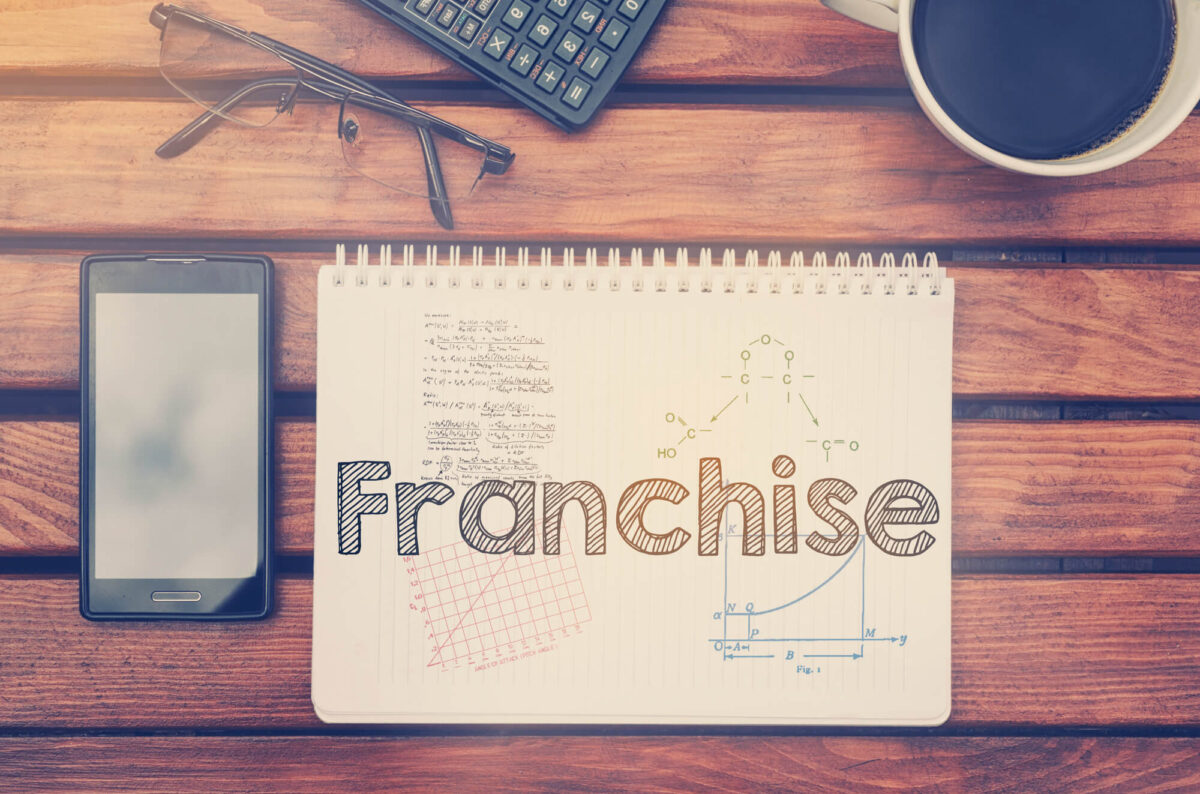
Do you ever feel like there just aren’t enough hours to do all the work at your job? Are you suffocating underneath your boss’s never-ending list of tasks and demands piling up faster than you can keep track of? You’re not alone.
Many people tire of corporate America and instead search for ways to take control of their professional lives. One popular option is turning towards franchising or starting a chain business. In fact, 95% of franchises are single-person owned and operated.
But what exactly is the difference between these two types of businesses? Follow along as we explore the subject of franchise vs. chain and what sets them apart so you can make an informed decision on which path works best for expanding your professional pursuits.
Franchise vs. Chain: Similarities & Differences
First thing first: the franchise vs. chain question is common among those looking to enter the business world (browse our FAQ section for other common questions we get about franchising). As mentioned, while both terms might seem interchangeable, they have some significant differences. And many people online seem to get them wrong.
In simple terms, a chain is a group of businesses with the same branding, operations, and management structure. Typically, the same controlling group manages everything.
On the other hand, a franchise is a more specific type of business ownership. With this business structure, the franchisee can use the franchisor’s branding, products and services, and business model.
However, there’s no one central operation hub. Instead, each franchisee manages their business’s location independently.
To help you make sense of the distinctions, we’ll detail some of the similarities and differences between these two business models to help you understand which may be the best option for you.
Similarities
Both chains and franchises are groups of businesses that share the same name, products, and services. They operate in multiple locations and maintain the same standards and protocols. The main difference is autonomy.
Another similarity is their marketing efforts. Both use national strategies to target their audience and attract customers. The goal, regardless of the business structure, is to:
- Create brand recognition
- Establish loyalty
- Increase revenue
Overall, both chains and franchises provide a reliable experience to customers who appreciate familiarity, consistency, and convenience. However, that doesn’t make them equal in terms of business investments. It pays to explore the differences to fully gauge which is best for you.
Differences
What are those differences exactly? Namely, it comes down to the business and earnings structure.
A chain has multiple locations that all operate under the same brand name, often with the same overall aesthetic, and one central corporate owner (such as Best Buy or Chipotle)
On the other hand, a franchise is owned and operated by an individual or group of individuals (known as a franchisee) under the umbrella of a larger company (known as the franchisor), such as Dunkin’ and and 7-Eleven.
Franchisees pay the franchisor for the right to use the company’s brand name, products, and business model. Examples of franchise restaurants include Subway, Domino’s Pizza, and IHOP. However, the payout structure and business model are the same whether it’s a restaurant or other type of business.
So, while both chains and franchises have multiple locations, the main difference is that franchises are owned and operated by individual business owners who pay to use a larger company’s brand and business model.
It’s important to note that while owning a franchise can be a great opportunity for entrepreneurs, it is important to carefully research the company and its franchise agreement before making a commitment (we’ll get into what those are in just a bit).
Pros & Cons of Owning a Franchise
If you’re considering buying a franchise, it’s important to understand the pros and cons before deciding. While owning a franchise can be a great opportunity for those seeking a proven business model and established brand recognition, it’s also a significant investment that shouldn’t be taken lightly.
Before committing to a franchise, it’s essential to research and understand all aspects of the business, from the initial investment and ongoing fees to the level of independence you’ll have as a franchisee.
Again, while owning a franchise makes sense for most, taking the time to understand each franchise opportunity is crucial to finding the right fit for you and your goals. Here’s a brief breakdown of the pros and cons to get a good idea of what you’re getting into.
Pros of Owning a Franchise
Owning a franchise brings plenty of benefits, especially if you want to be your own boss but need the security of a known brand.
One of the most significant advantages of owning a franchise is that you get to run a business that’s already established and recognized in the market. This makes it much easier to attract customers.
Plus, you’ll have access to:
- A proven business model
- Business training
- Ongoing support from the franchisor
These perks allow you to avoid costly mistakes typical for new business owners. Franchises typically have a lower failure rate than startups, thanks to the support and guidance provided by the parent company.
Additionally, having a well-known brand and standardized business practices can open up growth opportunities, such as expansion to multiple locations or acquisitions.
Another benefit is that you’ll become part of a larger network, allowing you to share best practices and resources with fellow franchisees. This community can be invaluable in terms of networking, learning from others’ experiences, and building lasting relationships.
Overall, owning a franchise can eliminate much of the guesswork involved in starting a new business, providing a quicker path to profitability and a higher chance of long-term success.
Con of Owning a Franchise
One major drawback is the high cost of entry. Franchise fees can be higher than simply managing your small business; ongoing royalties also add up quickly.
Additionally, as a franchise owner, you have to follow strict guidelines set by the franchisor. This can limit your creativity and flexibility in running the business. Furthermore, if the parent company runs into financial difficulties or a lawsuit, it can have a negative impact on your franchise.
It’s also important to note that many franchise agreements have strict termination clauses that can leave you with little recourse if you decide to leave the franchise.
Franchise agreements are legal contracts between two parties (you and the franchiser). They outline the terms and conditions for the franchisee to use the franchisor’s business model, trademarks, and operational practices in exchange for a fee.
How long is the agreement for? It depends. They typically last for a specific period, though, and include provisions for renewals and terminations.
Ultimately, owning a franchise requires careful consideration. They are great investments, but like any small business decision, you just want to double-check agreements, fees, and other factors.
You Can’t Own Chains
So, what are the pros and cons of investing in a chain? There really isn’t because you can’t “buy” a chain of businesses like you might a franchise. Well, you can, but that would mean investing in a multi-million dollar deal.
Chains are typically owned by large corporations that control everything from branding to the operations of the business. This means that investing in a chain is not an option for individual investors or small business owners.
So, the franchise vs. chain debate isn’t really about which is the best investment, then. It’s about whether you want to take one of two routes:
- Invest in an established franchise
- Start a new chain business from scratch (by establishing a brand and creating various locations of that exact same business)
From experience, we can tell you that franchises offer a unique business opportunity for individuals looking to start their own businesses without the hassle of starting from scratch.
As mentioned above in the pros and cons, franchisees benefit from the franchisor’s established branding and business practices while maintaining their independence as business owners.
So if you’re looking to invest in a business, remember that investing in a franchise is a smart option.
The upfront cost might look high at first. However, there typically aren’t astronomically high branding and marketing costs. That’s already done for you in most cases. You can also benefit from a likely loyal customer base (think Domino’s Pizza, for example).
The best part? You get to be your boss while still having the support of an established brand behind you. Cheers to not having to work directly for “the man.”
How to Buy a Franchise
So you’ve decided to take the leap and become a franchise owner, but how do you go about buying one? Luckily, plenty of resources are available online to help you find the perfect opportunity.
One of the first places to start is on franchise marketplaces, such as AmericasBestFranchises.com (yes, that’s us). These websites allow you to search for franchises by:
- Industry
- Investment
- Location
- Popularity
- Alphabetically
They also usually provide helpful resources and information on the franchise buying process. At least we do.
Before you start your search, it’s important to have a solid understanding of your investment range and the type of franchise that would be the best fit for you.
Once you’ve narrowed your options, thoroughly researching each franchise opportunity, including reviewing disclosures and financial documents, is important. Speak with current franchise owners to get a feel for the company culture and support system.
How to Start a Chain
It wouldn’t be fair to talk about the franchise vs. chain debate without also mentioning how to start a chain business. As mentioned, starting a chain business from scratch requires a tremendous amount of effort, dedication, and hard work.
First things first, you need to come up with a business concept that has the potential to be successful and sustainable in multiple locations. Then, you’ll need to meticulously plan every aspect of your business, from the brand colors to the customer experience.
Next, you’ll need to secure funding for your venture. This will likely involve pitching your business to investors or taking out loans. Once you’ve secured the funding, you’ll need to start scouting locations, negotiating leases, and hiring staff.
And that’s only the beginning. Once you’ve opened your first location, you’ll need to:
- Continuously assess and refine your business model
- Establish standardized operations
- Implement marketing strategies to attract customers
It’s a lot of work, but with determination and grit, being a chain owner can be a successful endeavor. It’s also a great way to invest in career development if you plan to manage other businesses. However, that’s the case as a franchise owner, too.
The bottom line is that it’s important to note (again) that building a chain business from scratch requires significantly more effort and resources than purchasing a franchise. With a franchise, you have the advantage of pre-established branding, customers, and support systems in place.
Find the Right Franchise
In conclusion, understanding the difference between franchise vs. chain is crucial before investing in or starting a business. While both have their merits, franchises offer a more structured model with the added benefit of established support systems.
If you’re ready to take the next step and invest in a franchise, we suggest you start your search by browsing for available franchises based on investment. This will help provide a good starting point for the types of franchises available within your budget.
Visit our franchise by investment section to get started. We’re here to help you find the perfect fit for your entrepreneurial journey.


